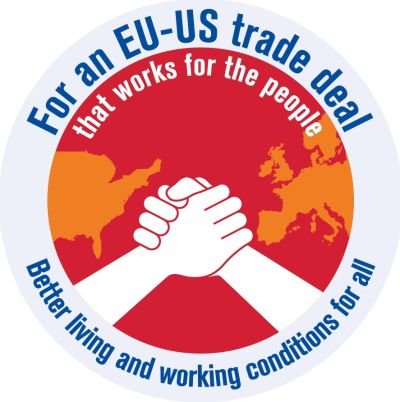Leaders of the American Federation of Labor – Congress of Industrial Organizations and the European Trade Union Confederation today called for a “gold standard” EU-US trade deal that improves living and working conditions on both sides of the Atlantic
As part of meetings today in Berlin, representatives from the AFL-CIO and ETUC concluded that increasing transatlantic trade could create new jobs and share prosperity, but must be done in a way that helps all working people.
“While past US trade agreements, like NAFTA, have helped boost the corporate bottom line, they have supressed wages and workplace rights, shrinking the middle class in the US, Mexico and Canada, said AFL-CIO President Richard Trumka. Trade policy for the privileged few must end. TTIP must work for the people, or it won’t work at all. ”
ETUC General Secretary, Bernadette Ségol, said: “European and American trade unionists are united in supporting a free trade deal between the EU and US only if it promotes workers’ rights, generates quality jobs, upholds public services and procurement, democratic decision making and international conventions.”
The ETUC and AFL-CIO agreed that the Transatlantic Trade and Investment Partnership currently being negotiated between the US and EU must
- ensure that the core conventions of the International Labour Organisation are adopted and enforced by all parties -including the freedom for workers to organise a union, collectively bargain with employers and strike when necessary
- reject all provisions, including investor-to-state dispute settlement (ISDS), that allow corporations, banks, hedge funds and other private investors to circumvent normal legislative, regulatory and judicial processes
- not undermine the role of the state in nurturing innovation, economic development and technological transformation
- not constrain national and local choices about the provision of public services, notably healthcare, education and environmental protection
- maintain the right of governments to make choices about procurement that alleviate joblessness, promote environmental responsibility, or address social injustices
- align with international agreements to protect the environment, including commitments to slow catastrophic climate change
- not be used to set a permanent ceiling on workers’ rights, environmental protections, or any other public interest measure—instead it must set up mechanisms that will support ever-improving norms that will help raise standards of living for all
- be negotiated and agreed through a transparent, democratic process
The trade union leaders agreed to continue to work closely together on TTIP.
For more information:
Julian Scola, Head of Press & Communications, ETUC, [email protected], mobile +32 486 117 394
Anthony DeAngelo, Media Outreach Specialist, AFL-CIO, [email protected], mobile +1 202 258 8138

